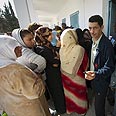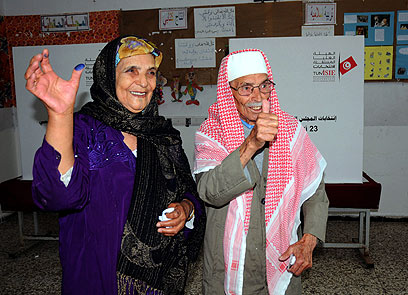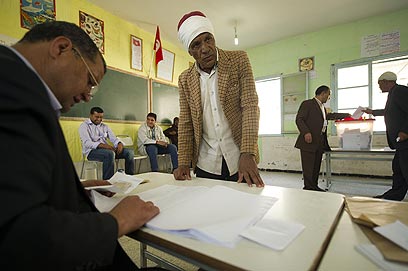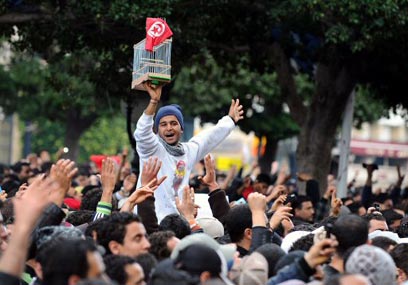
Early sign in Tunisia of strong Islamist vote
Early results from polling stations show a commanding lead for Ennahda, Tunisia's moderate Islamic party; more than 90% turn out to vote in African country's first free election
Tunisian authorities counted votes Monday in carefully watched elections, with early signs that a once-banned Islamist party is leading in many constituencies in the country that unleashed uprisings across the Arab world.
Related stories:
- Tunisian elections: Islamic party leads race
- Syrian protesters take inspiration from Libya
- Op-ed: Assad is next in line
Tunisia was known for decades for its repressive leadership but also for its progressive legislation on women and families, which secular-leaning Tunisians fear the moderate Islamist party Ennahda would roll back if it takes a commanding number of seats in the new assembly being created by Sunday's elections.
Radio Mosaique FM posted results from polling stations around the country Monday, with many showing a commanding lead for Ennahda. Officials familiar with the results elsewhere said the pattern was repeated across the country. Ennahda believes that Islam should be the reference point for the country's system and laws but maintains that it will respect women's rights and is committed to democracy and working with other parties.

Huge turnout in Tunisia's first elections (Photo: AFP)
Turnout in the country's first free elections, for an assembly which will sit for one year and draft a new constitution, was more than 90% – a mark of Tunisians' determination to exercise their new democratic rights after decades of repression.
US President Barack Obama said Tunisia's revolution in January, which began with Bouazizi and ended with autocratic President Zine Al-Abidine Ben Ali fleeing abroad, had "changed the course of history."
"Just as so many Tunisian citizens protested peacefully in streets and squares to claim their rights, today they stood in lines and cast their votes to determine their own future," he said in a statement issued by the White House.
The suicide of vegetable peddler Bouazizi, prompted by despair over poverty and government harassment, provoked mass protests which ended Ben Ali's 23-year grip on power.
This in turn inspired uprisings in Egypt, Libya, Yemen, Syria and Bahrain which have re-shaped the political landscape of the Middle East and North Africa.
Results expected on Monday
With an unexpectedly large number of ballot papers to count, election officials said it was likely to be Tuesday or even later before they have results to announce.

'Today I'm on duty for my country,' one mom said (Photo: EPA)
Ennahda, citing its own, unofficial tally from votes cast by the large Tunisian diaspora, said indications were that it had done well. Overseas voting was held days before Sunday's election.
"Ennahda was first in all the foreign polling stations," its campaign manager, Abdelhamid Jlazzi, told a gathering of party workers. "We got more than 50%."
Ennahda's fortunes may have a bearing on Egyptian elections set for next month in which the Muslim Brotherhood, an ideological ally, also hopes to emerge strongest.
The 217-seat assembly Tunisians are electing will, as well as re-writing the constitution, choose a new interim government and set dates for parliamentary and presidential elections.
Western diplomats say Ennahda is unlikely to win a majority of seats in the assembly in its own right, forcing it to make alliances with secularist parties and therefore diluting its influence.

Voters predicted Islamists could win (Photo: AFP)
Ennahda's leader Rachid Ghannouchi, who spent 22 years in exile in Britain, models his party on the moderate Islamist rule of Turkish Prime Minister Tayyip Erdogan.
He says his party will respect women's rights and not try to enforce any personal morality code on Tunisians.
'Islamists could win'
But the prospect of it winning a share of power still makes some people feel uncomfortable in Tunisia. It has secular traditions which go back to its first president after independence from France. He called the hijab, or Islamic head scarf, an "odious rag."
When Ghannouchi emerged from the polling station where he cast his vote on Sunday, about a dozen secularists shouted at him: "Degage", French for "Go away", and "You are a terrorist and an assassin! Go back to London!"
"I'm not so optimistic about the result of the vote," said Ziyed Tijiani, a 26-year-old architect after he cast his ballot on Sunday.

Tunisian uprising made way for elections (Photo: AFP)
"I think the Islamists could win. It's not want I want. They may try to change the way I live," he said, accompanied by a young woman in jeans and T-shirt.
Across the country on Sunday, queues stretching hundreds of meters long formed outside polling stations from early in the morning for an election which could set the template for other states emerging from the Arab Spring.
"This is the first time I have voted," said Karima Ben Salem, 45, at a polling station in the Lafayette area of Tunis.
"I've asked the boys to make their own lunch. I don't care ... Today I am not on duty. Or rather, I am on duty for my country," she said.
An Ennahda victory would be the first such success in the Arab world since Hamas won a 2006 Palestinian vote. Islamists won a 1991 election in Algeria, Tunisia's neighbor, but the army annulled the result, provoking years of conflict.

Getting ready for elections on Satuday (Photo: AP)
Tunisia has a tiny minority of hardline Islamists, but the policies Ennahda espouses are more in keeping with mainstream Tunisia, where most people take a laid-back view of Islam's strictures on things like drinking alcohol.
"This morning I voted for Ennahda and this evening I am going to drink a few beers," said Makram, a young man from the working class Ettadamen neighborhood of Tunis.
Yet observers say there is tension inside the party between Ghannouchi's moderate line and more vehement Islamists among the rank and file.
A final election rally on Friday illustrated the party's contradictions as Suad Abdel-Rahim, a tall, glamorous female Ennahda candidate who does not wear a veil, addressed the crowd.
But many books on sale on the fringes of the rally were by writers who belong to the strict Salafist branch of Islam. They believe women should be segregated from men in public and that elections are un-Islamic.
AP and Reuters contributed to the report
- Follow Ynetnews on Facebook
- Receive Ynetnews updates directly to your desktop










